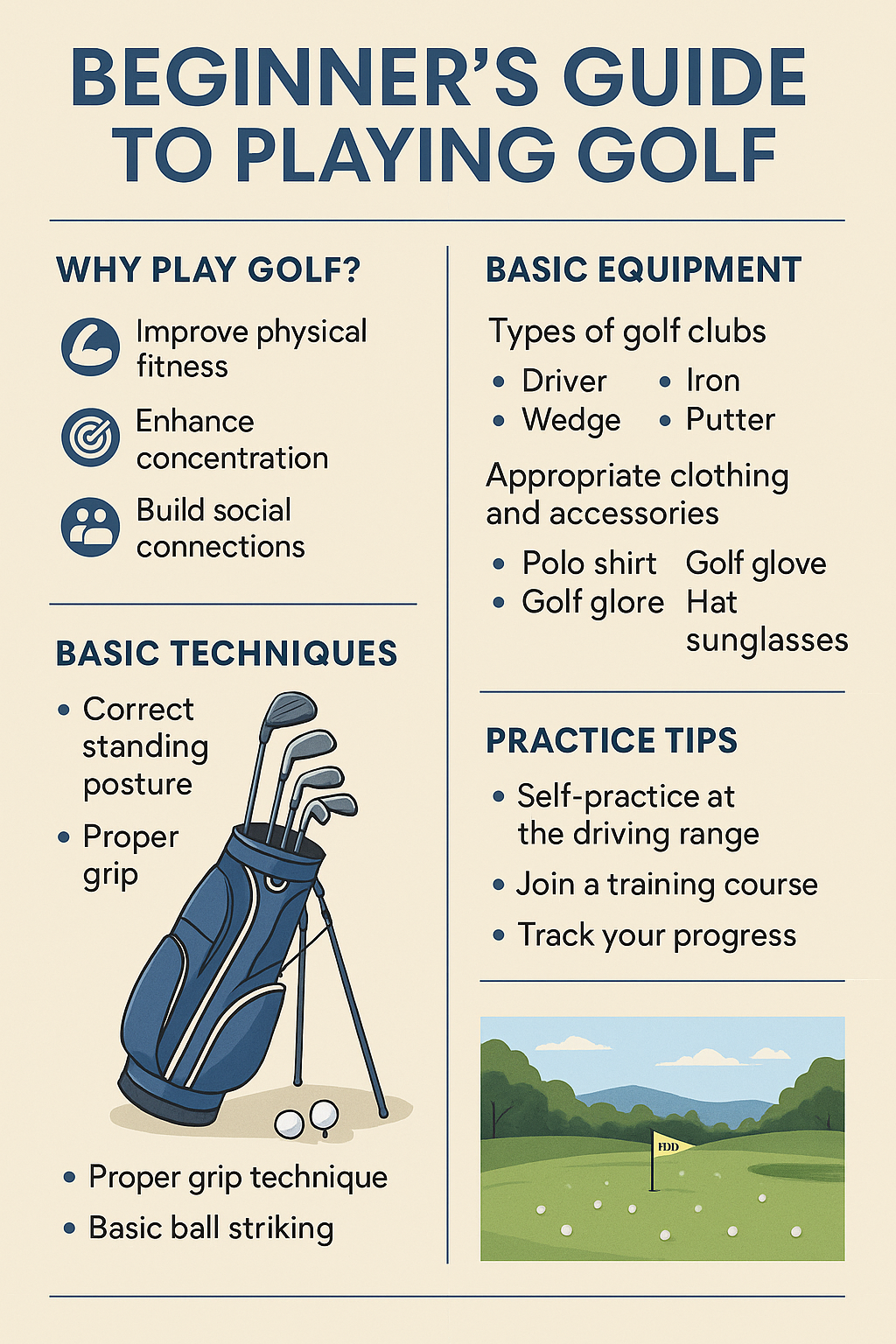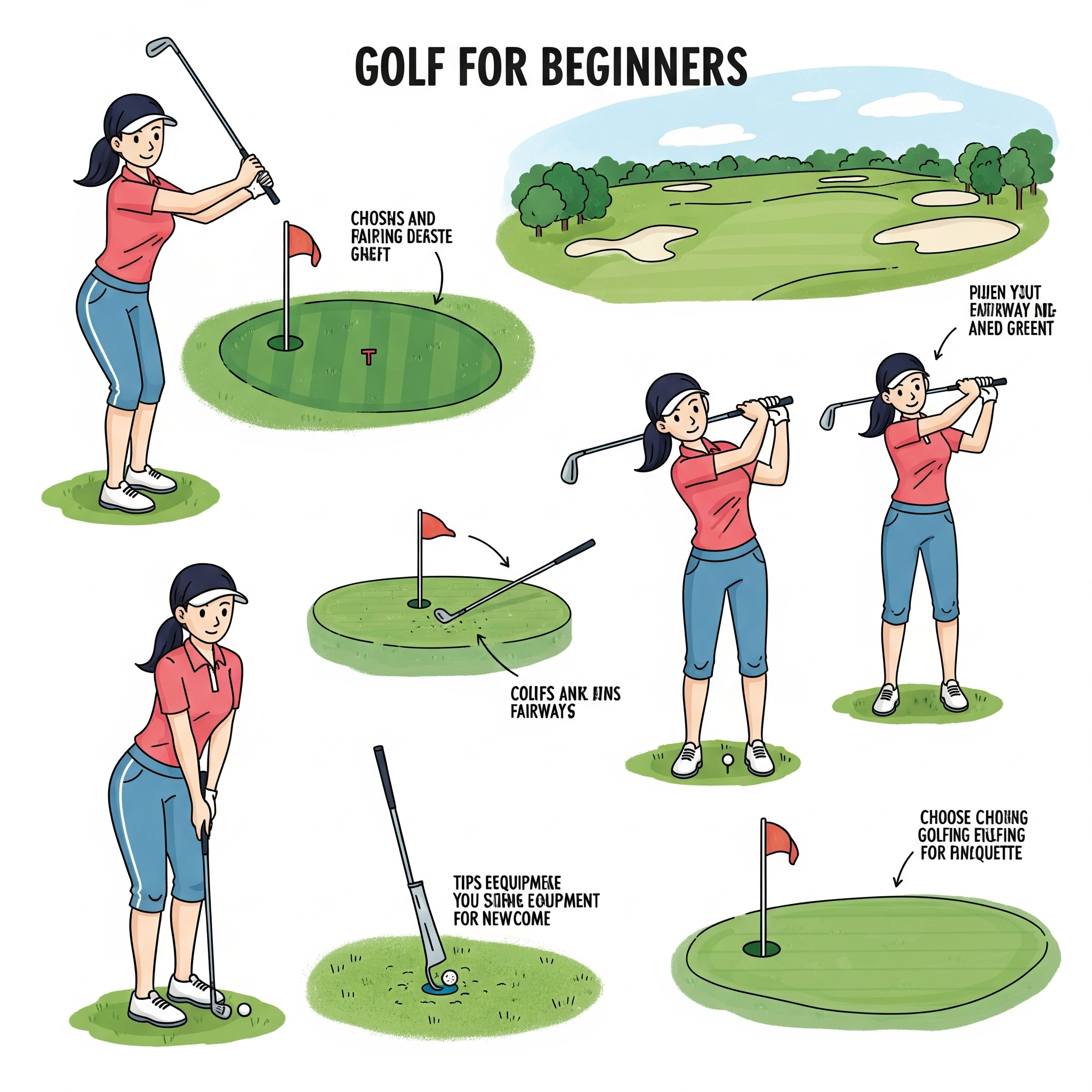Golf is a sport that requires patience, precision, and strong discipline. For beginners, approaching this sport may feel overwhelming without a clear roadmap for learning and practice. This article provides a comprehensive guide to playing golf for beginners, covering everything from selecting equipment, and learning basic techniques, to building effective practice habits.
Why Is Golf the Perfect Sport for Beginners?

Health and Mental Benefits
Golf isn’t just a sport for business people or the elite. It offers tremendous health and mental benefits:
- Physical Fitness: Walking around a large golf course (typically 5-7 km per round) improves cardiovascular health, builds endurance, and burns calories.
- Enhanced Focus: Golf requires concentration on each movement, helping players develop better focus and emotional control.
- Social Connections: It’s an excellent sport to expand your social network and build long-lasting business and personal relationships.
- Stress Relief: The peaceful, green environment of a golf course provides mental relaxation and a break from work-related stress.
Basic Equipment You Need Before Playing Golf
Types of Golf Clubs and How to Choose Them
A basic golf club set usually includes:
| Club Type | Primary Use |
|---|---|
| Driver | Tee shots for maximum distance |
| Iron | Shots from fairway or rough terrain |
| Wedge | Short shots to approach the green |
| Putter | Rolling the ball into the hole on the green |
Tip: Beginners should choose game improvement clubs that offer more forgiveness and control.
Essential Apparel and Accessories
- Polo shirts, khaki pants, or golf-specific skirts
- Soft-soled golf shoes
- Golf gloves
- Hat and sunglasses for sun protection
- Golf bag and balls
Proper attire ensures comfort during play and reflects respect for golf course etiquette.
Mastering the Basic Golf Techniques
Proper Golf Stance
A solid stance helps with balance and shot control:
- Feet shoulder-width apart
- Slight bend in the knees
- Straight back, leaning slightly forward
- Weight evenly distributed on both feet
Correct Grip Techniques
Three common grip styles:
- Interlock grip
- Overlap grip
- Baseball grip
Basic Ball Striking Techniques for Beginners
- Start with smooth, relaxed swings
- Follow a circular swing path with consistent tempo
- Focus on clean contact with the ball
- Watch your shot and adjust for improvement
Essential Golf Terminology for Beginners
| Term | Meaning |
|---|---|
| Tee Box | The starting area of each hole |
| Fairway | The short grass area between the tee and the green |
| Rough | Longer grass areas that are harder to play from |
| Green | The closely mown area where the hole is located |
| Par | Standard number of strokes for a hole |
| Birdie | One stroke under par |
| Bogey | One stroke over par |
| Handicap | A numerical measure of a player’s skill level |
Golf Etiquette and Behavior on the Course
Important Etiquette to Remember
- Stay quiet when others are taking shots
- Avoid walking across another player’s putting line
- Repair divots and ball marks on the green
Safety Rules and Respect for Others
- Wait for the group ahead to finish before hitting
- Shout “Fore!” to warn others of an errant shot
- Refrain from littering or smoking on the course
Effective Practice Steps for Beginners
Self-Practice at the Driving Range
- Regularly practice swings to develop muscle memory
- Start with wedges and irons before using drivers
- Break your session into warm-up, technique work, and full swings
Take Lessons from a Professional Coach
- Learn proper fundamentals and advanced techniques
- Get corrections on posture, swing, and game strategy
- Accelerate learning compared to self-teaching
Choosing the Right Golf Course for Beginners
- Start with 9-hole courses or beginner-friendly practice areas
- Prefer courses that offer coaching and beginner support
- Read reviews from online golf communities before selecting a course
Common Beginner Mistakes and How to Avoid Them
Trying to Hit Long Shots Right Away
- Mistake: Focusing on distance rather than accuracy
- Solution: Prioritize straight and controlled shots first
Neglecting Basic Swing Techniques
- Mistake: Improvising swing techniques without guidance
- Solution: Learn and practice fundamental swing mechanics with a coach
Creating a Practice Roadmap by Stages
| Stage | Practice Focus |
|---|---|
| 1-2 months | Learn stance, grip, and basic swing |
| 3-4 months | Practice iron shots and putting |
| 5-6 months+ | Play on 9-hole courses to gain real-game experience |
How to Track Progress and Improve Golf Skills
- Keep a log of scores for each session
- Record your swings on video for self-analysis
- Compare your shot distances and accuracy weekly
- Seek feedback from fellow players and coaches
Trusted Golf Learning Resources for Beginners
- Books: “Ben Hogan’s Five Lessons,” “The Little Red Book”
- YouTube Channels: Rick Shiels, Me and My Golf
- Websites: Golf Digest, Golf.com, PGA Tour Learning Center
- Apps: Golfshot, Hole19, Zepp Golf
Golf Clubs & Communities for Beginners
- Local golf clubs and beginner groups
- Facebook Groups like “Golf Vietnam” and “Chơi Golf Cùng Nhau”
- Forums: VietGolf, Vietnam Golf Magazine
- Small community tournaments for newcomers
Tips to Stay Motivated and Enjoy Golf Long-Term
- Set specific goals each month
- Join friendly matches with friends
- Change practice routines or equipment to keep things fresh
- Watch international tournaments for inspiration
The Future for New Golfers: From Hobby to Competitive Play
With consistent and proper practice, beginners can:
- Join amateur tournaments
- Lower their handicap
- Compete at semi-professional or professional levels if they are passionate and dedicated
FAQ: Frequently Asked Questions About Golf for Beginners
1. What do I need to prepare to start playing golf?
You need a basic set of clubs, proper attire, and an understanding of basic rules.
2. Where should beginners learn golf?
Start at a driving range and take lessons from a certified coach.
3. How long does it take to play golf proficiently?
With regular practice, most beginners can play consistently within 6 to 12 months.
4. Is golf an expensive sport?
The initial cost is relatively high, but you can control expenses by selecting affordable courses and equipment.
5. Can I play golf alone?
Yes, you can play solo or join a group of other golfers.
6. Do I need to be physically strong to play golf?
Good fitness helps, but patience and consistent practice are far more important.
Conclusion
We hope this guide to playing golf for beginners gives you a clear understanding and actionable steps to start your golf journey. Even as a novice, with persistence and regular practice, you can absolutely master this elegant sport.


Leave a Reply